Images by FreeBibleImages.org - used under license
Read Luke 10:38-42 (RSV): "Now as they went on their way, he entered a village; and a woman named Martha received him into her house. (39) And she had a sister called Mary, who sat at the Lord’s feet and listened to his teaching. (40) But Martha was distracted with much serving; and she went to him and said, 'Lord, do you not care that my sister has left me to serve alone? Tell her then to help me.' (41) But the Lord answered her, 'Martha, Martha, you are anxious and troubled about many things; (42) one thing is needful. Mary has chosen the good portion, which shall not be taken away from her.'"
Consider. Are you like Mary, listening to Jesus' word and receiving his guidance? Are you like Martha, gifted in serving others, but becoming overly busy and anxious? What is the one thing needful?
1. Martha welcomed Jesus as a guest into her home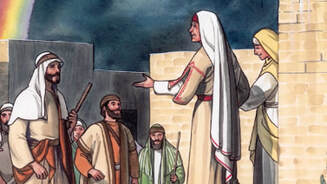 Martha Welcomes Jesus as a Guest Into Her Home Martha Welcomes Jesus as a Guest Into Her Home
Luke 10:38 tells us that when Jesus and his disciples were traveling to Jerusalem, Martha welcomed him as a guest into her home. Martha was the "mistress of the house," the head of the household (Ref. 1, Ref. 2). The Greek word translated as "welcomed" or "received" in Luke 10:38 means that Martha was personally responsible for seeing to Jesus' needs while he was under her roof (HELPS word-studies - Ref. 3).
2. Mary chose to sit at Jesus feet and was listening to him
Mary, too, was eager to give Jesus a fitting reception. Luke 10:39-40 and 42 tell us that she left Martha in making preparations and instead chose [decided, made a deliberate choice] to sit at Jesus' feet and listen to his word (Ref. 4). In the ancient world, sitting at a teacher's feet -- literally and figuratively -- was the posture of disciples or learners (2 Kings 4:38, Luke 8:35, Acts 22:3, Ref. 5). By her action, Mary showed that she was willing to receive Jesus' word and give up herself to the guidance of Christ -- the one thing needful (Ref. 6).
3. Martha was distracted with much serving
Luke 10:40 tells us that Martha was "distracted with much serving." Note that "serving" [Greek word diakonia - ministry - Ref. 7] is one of the "gifts of grace" that the Apostle Paul mentions in Romans 12:6-8. Martha was gifted at serving others (John 12:1-2). However, in Luke 10:40-41 Martha became so "distracted" [literally drawn away] by the many tasks she was doing that she was drawn away from listening to Jesus and his word (Ref. 8).
4. Jesus tenderly reproved Martha for being anxious about many things
Martha asked Jesus to reprove Mary for leaving Martha to do the serving alone (Luke 10:40). Instead, Jesus instead tenderly reproved Martha, saying, "Martha, Martha, you are anxious and troubled about many things" (Luke 10:41). Jesus did not reprove Martha for her hospitality or her gift of serving. However, Jesus did gently reprove Martha for being anxious [worried, divided, figuratively "going to pieces"] and troubled [disturbed, agitated] about many things (Ref. 9, Ref. 10).
5. Jesus commended Mary for choosing the one thing needful
Jesus commended Mary for choosing the good portion, the one thing needful. Mary chose to give undivided devotion to Jesus -- to listen to his word and to give herself to his guidance (Ref. 6).
Apply. Make time each day for the one thing needful -- Give undivided devotional time to Jesus. Listen to Jesus' word. Pray. Receive Jesus' guidance and follow his priorities for the things you will do to serve others each day.
References
1. https://biblehub.com/commentaries/barnes/luke/10.htm Barnes' notes on Luke 10:38 2. https://www.merriam-webster.com/dictionary/mistress 3. https://biblehub.com/greek/5264.htm 4. https://biblehub.com/greek/1586.htm 5. https://biblehub.com/commentaries/barnes/luke/10.htm Barnes notes on Luke 10:39 6. https://biblehub.com/commentaries/mhc/luke/10.htm Matthew Henry's Commentary on Luke 10:38-42 7. https://biblehub.com/greek/1248.htm 8. https://biblehub.com/greek/4049.htm 9. https://biblehub.com/greek/3309.htm 10. https://biblehub.com/greek/2350.htm
0 Comments
"The Lord is my shepherd; I shall not want. He makes me lie down in green pastures. He leads me beside still waters. He restores my soul. He leads me in paths of righteousness for his name's sake." (Psalm 23:1-3) "I am the good shepherd." (John 10:11, 14) This article describes the author background and then the scripture allusions for verse 1 of the hymn, "Savior, Like a Shepherd Lead Us." This article is the first in a series on this theologically-rich children's hymn. Reference 2 describes the scripture allusions in verse 2 of "Savior, Like a Shepherd Lead Us." Hymn Text Author Researchers do not know for sure the circumstances about how the text for "Savior, Like a Shepherd Lead Us" was written; however, researchers attribute this beloved hymn of the Christian faith to Englishwoman Dorothy Ann Thrupp (1779-1847) (Ref. 3, Ref. 4). Miss Thrupp is "particularly remembered as a writer of hymns for children" (Ref. 4). "Savior, Like a Shepherd Lead Us" first appeared unsigned (unattributed) in her collection, Hymns for the Young, in 1836 (Ref. 4). Ms. Thrupp wrote this hymn for teaching young children the message of a "caring Christ who loves all his children" (Ref. 3). 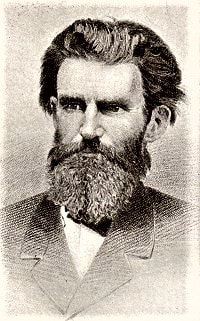 William B. Bradbury (Ref. 6) William B. Bradbury (Ref. 6) Hymn Tune Composer William Batchelder Bradbury (1816-1868) was an American musician who composed the tune in 1859 most often associated with "Savior, Like a Shepherd Lead Us" (Ref. 3, Ref. 5 below, Ref. 6). He named the tune "Bradbury" after himself (Ref. 3, Ref. 5). Mr. Bradbury "modified the original words meant for children and broadened the meaning to include all the congregation" (Ref. 3). Mr. Bradbury also composed the tunes to many popular hymns including "Jesus Loves Me," "He Leadeth Me," and "My Hope is Built" (Ref. 6). In addition to being an excellent musician and composer, Mr. Bradbury served as a music educator, choir leader, organist, and was a devoted reader of the Bible (Ref. 7, Ref. 8). All of the Bible verses below are linked to the BibleGateway.com website (Ref. 9). The verses below are quoted from the English Standard Version (ESV) unless noted otherwise. To see the lyric sheet for all four verses of "Savior, Like a Shepherd Lead Us" on one page, click here. The lyrics are provided by Timeless Truths (Ref. 10). Scripture Allusions - Verse 1 The first verse of this great hymn teaches children that Christ is our great Shepherd who leads us, cares for us, feeds us, and protects us. The verse also explains that Christ has redeemed us and that we are his possession. "Savior, like a shepherd lead us, much we need Thy tender care" The Lord is our Shepherd who leads us and cares for us. Psalm 23:1-3 -- "The Lord is my shepherd; I shall not want. (2) He makes me lie down in green pastures. He leads me beside still waters. (3) He restores my soul. He leads me in paths of righteousness for his name's sake." Psalm 23:5 -- "You prepare a table before me in the presence of my enemies; you anoint my head with oil; my cup overflows." Isaiah 40:11 (KJV) -- "He shall feed his flock like a shepherd: he shall gather the lambs with his arm, and carry them in his bosom, and shall gently lead those that are with young." John 10:11 -- "I am the good shepherd." (also John 10:14) "In Thy pleasant pastures feed us, for our use Thy folds prepare." The Lord feeds us in pleasant pastures and protects us. Ezekiel 34:14 (KJV) -- "I will feed them in a good pasture, and upon the high mountains of Israel shall their fold be: there shall they lie in a good fold, and in a fat pasture shall they feed upon the mountains of Israel." 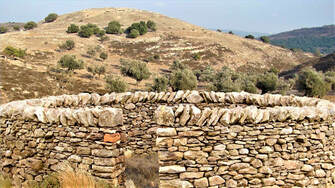 Permanent Sheepfold Enclosure - Holy Land. Photo Copyright David Padfield. Used under license. Photo source: FreeBibleImages.org. Permanent Sheepfold Enclosure - Holy Land. Photo Copyright David Padfield. Used under license. Photo source: FreeBibleImages.org. A fold was a walled in, hedged, or fenced place for keeping and protecting sheep or other livestock (Ref. 11, Numbers 32:24 KJV). Jesus referred to such a sheepfold in John 10:1 (KJV). "Truly, truly, I say to you, he who does not enter the sheepfold by the door but climbs in by another way, that man is a thief and a robber." Jesus not only is the means of access to the fold; he also is the Shepherd who protects the sheep in the fold with his own body at the door. "I am the door. If anyone enters by me, he will be saved and will go in and out and find pasture" (John 10:9, Ref. 12). "Blessed Jesus, blessed Jesus! Thou hast bought us, Thine we are." (Phrase repeated) The phrase, "Thou hast bought us, Thine we are," explains to children the meaning of redemption. HELPS Word-studies defines redeem as "to release (set free) by paying the full ransom"; (figuratively) to restore "something back, into the possession of its rightful owner" (Ref. 13). Christ has purchased us and now we are his possession. Titus 2:13-14 (italics added) -- " ... waiting for our blessed hope, the appearing of the glory of our great God and Savior Jesus Christ, who gave himself for us to redeem us from all lawlessness and to purify for himself a people for his own possession who are zealous for good works." 1 Peter 1:18-19 (KJV) -- "Forasmuch as ye know that ye were not redeemed with corruptible things, as silver and gold, from your vain conversation received by tradition from your fathers; But with the precious blood of Christ, as of a lamb without blemish and without spot." Listen and Sing Along Click on this YouTube link - Solo piano meditation on the hymn "Savior, like a Shepherd Lead Us" with sing-along lyrics. Recorded by Rick Betts - March, 2011. Prayer Thank you, Jesus, for being my Savior and Shepherd. Thank you for leading me and for all the ways that you care for me. References
1. http://diglib.library.vanderbilt.edu/act-imagelink.pl?RC=48288 2. http://www.scriptureway.com/home/savior-like-a-shepherd-lead-us-scripture-allusions-verse-2 3. https://www.umcdiscipleship.org/resources/history-of-hymns-savior-like-a-shepherd-lead-us 4. https://en.wikipedia.org/wiki/Dorothy_Ann_Thrupp 5. The United Methodist Hymnal, The United Methodist Publishing House, 1989 6. https://en.wikipedia.org/wiki/William_Batchelder_Bradbury 7. https://www.wholesomewords.org/biography/bbradbury.html 8. http://www.hymntime.com/tch/bio/b/r/a/d/bradbury_wb.htm 9. https://www.biblegateway.com/ 10. Reference 10 begins next line https://library.timelesstruths.org/music/Savior_Like_a_Shepherd_Lead_Us/ 11. https://www.biblegateway.com/resources/encyclopedia-of-the-bible/Fold 12. http://www.ScriptureWay.com/home/jesus-is-the-door 13. https://biblehub.com/greek/3084.htm
"You will know them by their fruits." (Matthew 7:16)
"By this the children of God and the children of the devil are obvious: anyone who does not practice righteousness is not of God, nor the one who does not love his brother." (1 John 3:10) "For all who are being led by the Spirit of God, these are sons of God." (Romans 8:14)
This lesson is the second in a series on "The Children of God." The first lesson in the series discussed "Becoming a Child of God" (Ref. 1). Today's lesson is the first of two lessons on the Characteristics of a Child of God.
Consider. The Bible describes the children of God as having certain characteristics. How do you know a child of God when you see one? What are the distinguishing marks of a child of God?
A Child of God Bears Spiritual Fruit
A child of God passes the fruit test. Jesus said, "You will know them by their fruits. Grapes are not gathered from thorn bushes nor figs from thistles, are they?" (Matthew 7:16) A child of God is recognized by the fruit that he or she bears.
Jesus said that in order to bear much fruit, we must abide in (remain in, stay connected to) him. "I am the vine, you are the branches; he who abides in Me and I in him, he bears much fruit, for apart from Me you can do nothing " (John 15:5, Ref. 2). Bearing spiritual fruit is the natural outgrowth of being attached to the vine, Jesus Christ. The Apostle Paul describes the fruit of the Spirit as "love, joy, peace, patience, kindness, goodness, faithfulness, gentleness, self-control" (Galatians 5:22-23). The first characteristic of a child of God is a person who is bearing spiritual fruit. A Child of God Practices Obedience, Righteousness, and Godliness
A child of God practices obedience, righteousness, and godliness:
A Child of God is Led by the Spirit
When we are a child of God, the Holy Spirit is our guide for life (Romans 8:14). The Holy Spirit guides us into all the truth and helps us understand the scriptures (John 16:13, John 14:26, Ref. 6). The Holy Spirit helps us to put to death the deeds of the flesh (Romans 8:13). The Holy Spirit guides us in making decisions (James 1:5), what to do (Acts 10:19-20), and where to go (Acts 16:6-10). A child of God has an active, dynamic relationship with God, and follows the leading of the Holy Spirit in his/her life.
Apply. Are you exhibiting the distinguishing characteristics of a child of God? Consider the main points in this lesson:
Related Topics
"Becoming a Child of God" (John 1:12-13) "Characteristics of a Child of God - Part 2" (Matthew 5:16) "Our Adoption as God's Children" (Galatians 4:4-5)
References
1. http://www.ScriptureWay.com/home/becoming-a-child-of-god 2. http://www.ScriptureWay.com/home/jesus-is-the-true-vine 3. https://biblehub.com/greek/1343.htm 4. https://biblehub.com/greek/1128.htm 5. https://biblehub.com/greek/2150.htm 6. http://www.ScriptureWay.com/home/the-spirit-of-truth 7. http://www.ScriptureWay.com/home/characteristics-of-a-child-of-god-part-2
Today's lesson explores the Bible verses behind the excellent hymn, "Teach Me Thy Way, O Lord."
Hymn Author and Composer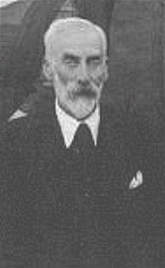 Benjamin Mansell Ramsey (Ref. 2) Benjamin Mansell Ramsey (Ref. 2)
Benjamin Mansell Ramsey wrote the text for "Teach Me Thy Way, O Lord" based on Psalm 27:11 and several additional Scripture verses. Mr. Ramsey also composed the tune, "Camacha," which we use today when singing this hymn.
Benjamin Mansell Ramsey (1849 - 1923) was an English organist and amateur composer (Ref. 1). He also was a well-known music teacher near Bournemouth, England. Mr. Ramsey composed songs, piano pieces, and carols. He also wrote works on music theory (Ref. 2). Wikipedia reports that Mr. Ramsey also conducted an amateur orchestra in the 1880s, and was involved in establishing the Bournemouth Municipal Orchestra in 1893 (Ref. 1). He is best known for his hymn tune, "Camacha," and the text he wrote for "Teach Me Thy Way, O Lord" in 1919. For those of you who are interested in geography, Bournemouth is located on the south coast of England (see map, Ref. 3). Scripture Allusions
I suggest that you refer to the attached hymn sheet music for the following discussion of the Scripture verses and the hymn text (Ref. 4).
"Teach me Thy way." Mr. Ramsey skillfully wrote this hymn around the Biblical phrase, "Teach me Thy way." He included the phrase, "Teach me Thy way," 13 times in verses one through four. In the Old Testament, the Way of the Lord referred to keeping God's commandments (Deuteronomy 5:33, Ref. 5). In Joseph Benson's Commentary, the phrase "Teach me Thy way, O Lord" means "What course I shall take to please thee, and to discharge my duty, and to save myself from ruin" (Ref. 6). David, the Psalmist, asked God to teach him God's way in Psalm 27:11 and Psalm 86:11. Psalm 25:4-5 is similar. David’s request to God, "Teach me Thy way, O Lord," is an excellent example for us to follow (Ref. 5). "Thy guiding grace afford" (hymn, verse 1). These words call to my mind Jesus' promise in John 16:13, "But when He, the Spirit of truth, comes, He will guide you into all the truth." Jesus promised us as believers that the Holy Spirit will guide us. The Greek word for guide in John 16:13 is hodégeó, which literally means "to show the way" (Ref. 7, Ref. 8). Now we can see the close connection between the prayerful hymn words in verse 1, "Teach me Thy way, O Lord" and "Thy guiding grace afford." As believers in Christ, we need the Holy Spirit's guidance to teach us God's way and truth in each of our life's circumstances.
"Help me to walk aright, more by faith, less by sight" (hymn, verse 1). This hymn phrase likely refers to Paul's statement in 2 Corinthians 5:7, "For we walk by faith, not by sight."
"Make Thou my pathway plain" (hymn, verse 3). Psalm 27:11 begins with the words, "Teach me thy way, O Lord" and ends with the words, "and lead me in a plain path, because of mine enemies" (KJV translation). The transliteration of the Hebrew word for plain is mishor (Ref. 9). In Psalm 27:11, mishor means literally a level place (free from obstacles) and figuratively, a place of safety, comfort, prosperity (Ref. 9). In the literal sense, a plain is a level area or plateau as compared to a mountainous area, for example, 1 Kings 20:22-25. In the figurative sense, David's prayer to make his pathway plain (Psalm 27:11) was to request that God would make his way safe (Ref. 10).
Mr. Ramsey wrote in verse 3 of the hymn, "Shine through the cloud and rain, through sorrow, toil, and pain; Make Thou my pathway plain, teach me Thy way!" With these words, we pray that God will make our way safe and that God will comfort us through these difficult times.
"Until the race is won" and "Until the crown is won" (hymn, verse 4). Mr. Ramsey likely drew inspiration from 1 Corinthians 9:24-25 which alludes to both of these phrases. "Don’t you know that the runners in a stadium all race, but only one receives the prize? Run in such a way to win the prize. Now everyone who competes exercises self-control in everything. However, they do it to receive a crown that will fade away, but we a crown that will never fade away."
Let us resolve to run the race with endurance that God has given us, fixing our eyes on Jesus, the author and perfecter of faith (Hebrews 12:1-2).
Listen. I suggest that you listen to one or both of the following Youtube videos to hear examples of how the hymn can be sung.
Traditional hymn in 3/4 time - The Metropolitan Tabernacle, London congregation singing "Teach Me Thy Way, O Lord" - Click here. This contemporary, 4/4 time solo arrangement of "Teach Me Thy Way, O Lord" in 4/4 time will uplift you. Click here.
Apply. In what aspect of your life today do you need God to remove obstacles and to make your pathway plain or safe? Pray and ask God to teach you his way and to give you his guidance.
References
1. https://en.wikipedia.org/wiki/B._Mansell_Ramsey 2. http://www.hymntime.com/tch/bio/r/a/m/ramsey_bm.htm 3. https://www.worldatlas.com/eu/gb/eng/where-is-bournemouth.html 4. https://library.timelesstruths.org/music/Teach_Me_Thy_Way_O_Lord/ 5. http://www.scriptureway.com/home/the-way-of-the-lord-old-testament 6. https://biblehub.com/commentaries/benson/psalms/27.htm 7. https://biblehub.com/greek/3594.htm 8. http://www.scriptureway.com/home/the-spirit-of-truth 9. https://biblehub.com/hebrew/4334.htm 10. https://biblehub.com/commentaries/cambridge/psalms/27.htm
Copyright: digitalskill / 123RF Stock Photo
"But when He, the Spirit of truth, comes, He will guide you into all the truth; for He will not speak on His own initiative, but whatever He hears, He will speak; and He will disclose to you what is to come. He will glorify Me, for He will take of Mine and will disclose it to you." (John 16:13-14)
"The Holy Spirit is our Guide, not only to show us the way, but to go with us by continued aids and influences." -- Matthew Henry (Ref. 1)
This lesson is the fourth in the series, "About the Truth." Today's lesson focuses on the role of the Holy Spirit as the "Spirit of Truth."
Consider.
Jesus promised his disciples that the Spirit of truth would come.
Jesus was speaking to his disciples on the evening before his death. In the beginning of John 16:13, Jesus told them that the Spirit of truth would come. God fulfilled the promise of sending the Holy Spirit, the Spirit of truth, beginning at Pentecost (Acts 2:1-4). Jesus' promise of sending the Holy Spirit, the Spirit of truth, continues for believers to this day (Acts 2:37-39).
The Spirit of truth guides believers into all the truth.
The Greek word in John 16:13 for guide is the verb, hodégeó. Strong's Concordance tells us that hodégeó means to show the way -- to teach, guide, lead (Ref. 2).
In Acts 8:25-40, we see an example of what it means to guide. An angel of the Lord sent Philip to the road that descends from Jerusalem to Gaza (Acts 8:26). There Philip met the chariot of an Ethiopian eunuch who was returning from Jerusalem. At the Spirit's direction, Philip joined the eunuch in the chariot (Acts 8:29). The eunuch was reading Isaiah the prophet. Philip asked him, "Do you understand what you are reading?" (Acts 8:30) The eunuch replied, "Well, how could I unless someone guides me?" (Acts 8:31, italics added) Philip explained the scripture to the eunuch and "preached Jesus to him" (Acts 8:35). As the result, the Ethiopian eunuch believed that Jesus Christ is the Son of God (Acts 8:37), and Philip baptized him (Acts 8:38). Note what Jesus said in John 16:13. "He (the Spirit of truth) will guide you into all the truth." In his commentary, Charles John Ellicott (1819–1905) says that the words, "all the truth," mean that the Spirit of truth "will be their guide into the fulness [sic] of truth." Ellicott adds, "The promise has special meaning for the disciples to whom it was spoken; but it holds good for every disciple who seeks to know the truth" (Ref. 3, Ref. 4). The Spirit of truth speaks what he has heard from the Father and the Son.
The Holy Spirit does not speak from himself. The Holy Spirit fulfills his mission when he speaks truth directly from the Father and Son to the believer. The King James Version translates the verse well. "When he, the Spirit of truth, is come, he will guide you into all truth: for he shall not speak of himself; but whatsoever he shall hear, that shall he speak" (John 16:13, italics added).
The Spirit of truth glorifies the Son.
Jesus said, "He will glorify Me, for He will take of Mine and will disclose it to you" (John 16:14). The Greek word for glorify in John 16:14 is doxazó, which means make glorious, honor, magnify (Ref. 5 below). Doxazó is very similar to the Greek word doxa, which means to honor, praise, worship (Ref. 5). When we sing the Doxology in a worship service we express our praise and worship of God (Ref. 6). When the Holy Spirit guides us into truth, it is an act of worship that glorifies Jesus, the Son of God.
Prayer. Thank you, Lord, for sending the Spirit of truth to be with us and to guide us into all of your truth.
Related Lessons
"God's Truth in the Old Testament" (Psalm 119:160) "Jesus is the Truth" (John 14:6) "Know the Truth (John 8:32)" "Jesus - Witness to the Truth" (John 18:37)
References
1. https://biblehub.com/commentaries/mhc/john/16.htm 2. https://biblehub.com/greek/3594.htm 3. https://biblehub.com/commentaries/john/16-13.htm 4. https://en.wikipedia.org/wiki/Charles_Ellicott 5. James Strong, "The New Strong's Exhaustive Concordance of the Bible," Thomas Nelson Publishers, 1995 - note, based on the King James Version of the Bible 6. http://www.hymntime.com/tch/htm/d/o/x/doxology.htm
"The entirety of Your word is truth, and all Your righteous judgments endure forever" (Psalm 119:160).
This article is the first in the series, "About the Truth." This article focuses on what the Old Testament says about God's truth.
The Truth of God in the Old Testament
Definition. The main Hebrew word for "truth" in the Old Testament is emeth. Emeth means "firmness, faithfulness, truth" (Ref. 1).
The word emeth first occurs in Genesis 24:27, when Abraham's servant completes his journey to find a bride for Abraham's son, Isaac. “Blessed be the Lord God of my master Abraham, who has not forsaken His mercy and His truth toward my master. As for me, being on the way, the Lord led me to the house of my master’s brethren.”
Consider. Let's look together at several verses which describe the attributes, or characteristics, of God's truth.
God's commandments are truth itself.
"Your righteousness is an everlasting righteousness, And Your law is truth" (Psalm 119:142).
"You are near, O Lord, And all Your commandments are truth" (Psalm 119:151). "The entirety of Your word is truth, and all Your righteous judgments endure forever" (Psalm 119:160). Think ahead to Pilate's question to Jesus, "What is truth?" (John 18:38). The writer of Psalm 119 answers Pilate's question. God's word is truth. God's truth leads us and guides us.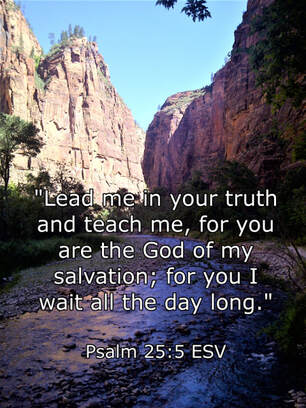 Zion National Park, Utah with Psalm 25:5 - Photo by Whitney V. Myers Zion National Park, Utah with Psalm 25:5 - Photo by Whitney V. Myers
David prayed, "Lead me in your truth and teach me, for you are the God of my salvation; for you I wait all the day long" (Psalm 25:5).
John the disciple confirmed this principle when he quoted Jesus. "But when He, the Spirit of truth comes, He will guide you into all the truth" (John 16:13). God's truth protects us.
In Psalm 91, the psalmist writes, "He will cover you with His pinions, And under His wings you may seek refuge; His faithfulness (emeth, truth) is a shield and bulwark" (Psalm 91:4, italics added). Merriam-Webster defines a bulwark as a solid wall-like structure raised for defense (Ref. 2).
David expressed his confidence in God's truth to protect him. "Lord, do not withhold Your compassion from me; Your constant love and truth will always guard me" (Psalm 40:11). Recall how Jesus used God's truth (from the Old Testament) to defend himself from Satan's temptations and to end Satan's attack (Matthew 4:1-11). God's truth is everlasting.
"For His lovingkindness is great toward us, And the truth of the Lord is everlasting. Praise the Lord!" (Psalm 117:2)
Martin Luther confirmed this principle in "A Mighty Fortress is our God" when he wrote, "God's truth abideth still" (Ref. 3). As believers in Christ, God's truth is our standard. God's truth endures forever and does not change.
Apply. Let's review the four principles in this lesson:
1. God's commandments are truth itself (Psalm 119:160) 2. God's truth leads us and guides us (Psalm 25:5) 3. God's truth protects us (Psalm 91:4) 4. God's truth is everlasting (Psalm 117:2) How can you apply these principles to your life today?
Related Lessons
"Jesus is the Truth" (John 14:6) "Know the Truth (John 8:32)" "The Spirit of Truth" (John 16:13-14) "Jesus - Witness to the Truth" (John 18:37)
"You shall walk in all the way that the Lord your God has commanded you, that you may live, and that it may go well with you, and that you may live long in the land that you shall possess." (Deuteronomy 5:33) Consider. Jesus said "I am the way" (John 14:6). The "way of the Lord" was a concept familiar to Jesus' Jewish listeners. Consider these principles from the Old Testament. What was the way that God had commanded? Please read through the Ten Commandments (Deuteronomy 5:1-21). Consider the three-fold blessing God promises for the nations and people who keep his commandments – "that you may live, and that it may go well with you, and that you may live long in the land which you shall possess" (Deuteronomy 5:33). 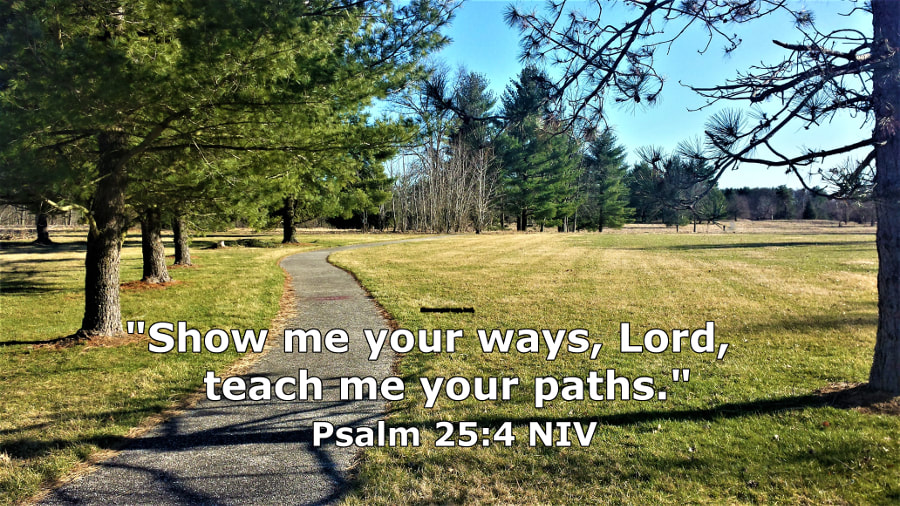 Gettysburg National Military Park Path with Psalm 25:4 - Photo by Whitney V. Myers Gettysburg National Military Park Path with Psalm 25:4 - Photo by Whitney V. Myers David asked God to "Teach me Thy way, O Lord." "Teach me your way, O Lord, and lead me on a level path because of my enemies" (Psalm 27:11). "Make me to know your ways, O Lord; teach me your paths" (Psalm 25:4). David’s request to God, "Teach me Thy way, O Lord," is an excellent example for us to follow. Apply. Are you walking in the way of the Lord? Are you obeying God's commandments? Deuteronomy 5:1-21 Related Lessons "What Does 'the Way' Mean in the New Testament?" "Psalm 37:5 Meaning - Commit Your Way to the Lord" To learn more about the following topics, please visit the About the Way page or the previous posts with dates noted:
|
Daily Bible Verse(Click the link above) AuthorMr. Whitney V. Myers. Christian. For more information, please visit the Author Page. Posting ScheduleI plan to provide new postings about once a month. Planned Topics(subject to change) Recent Posts(most recent three months) Popular Posts(top 10) Categories
All
Archives
July 2024
|
|
Copyright 2018-2024 Whitney V. Myers |
Listed in Feedspot's Top 100 Bible Study Blogs and Websites |
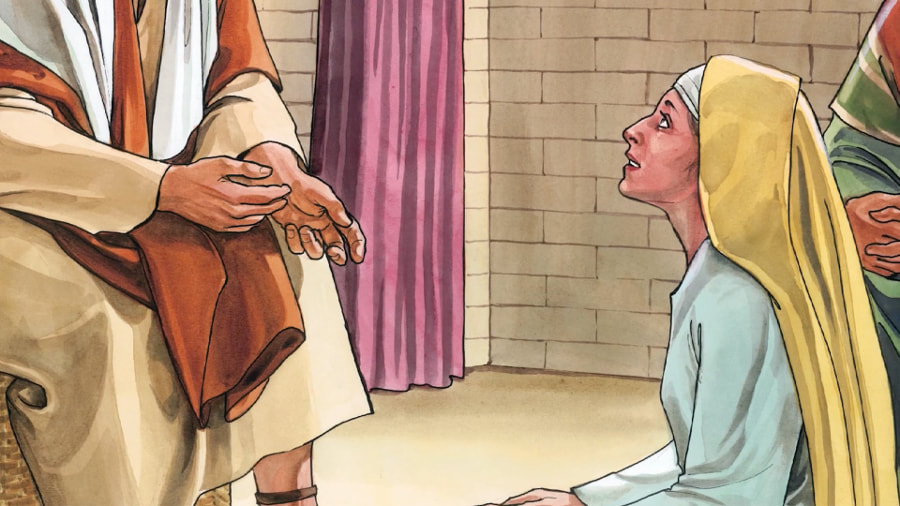
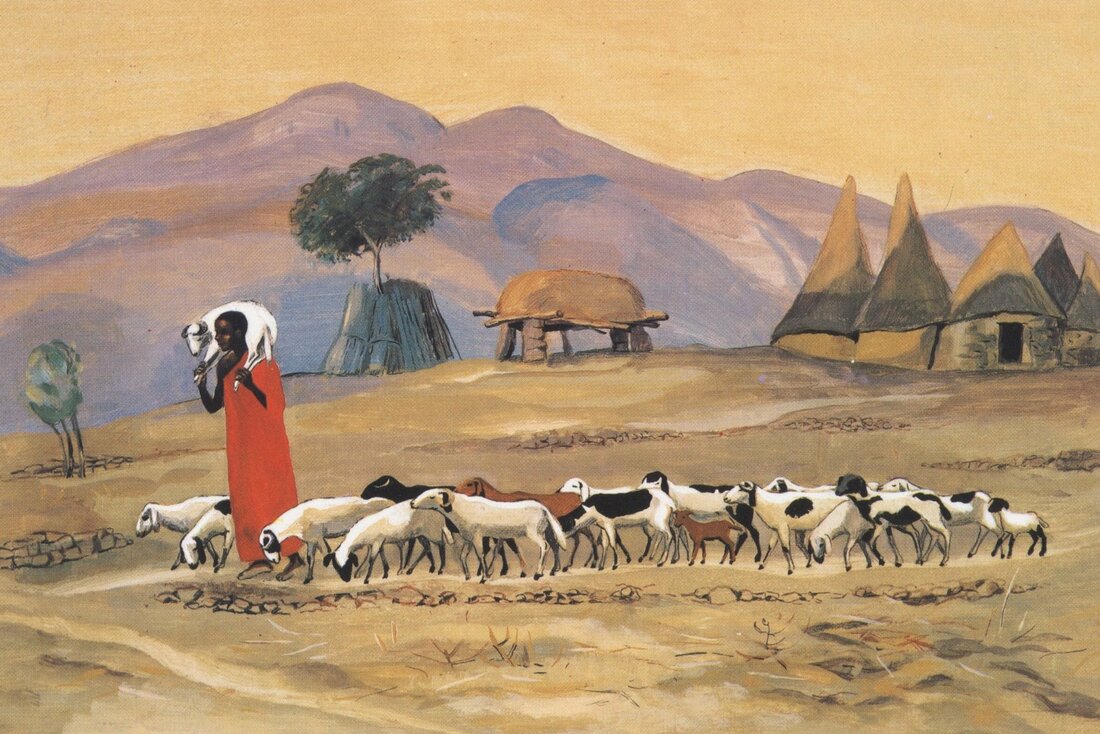
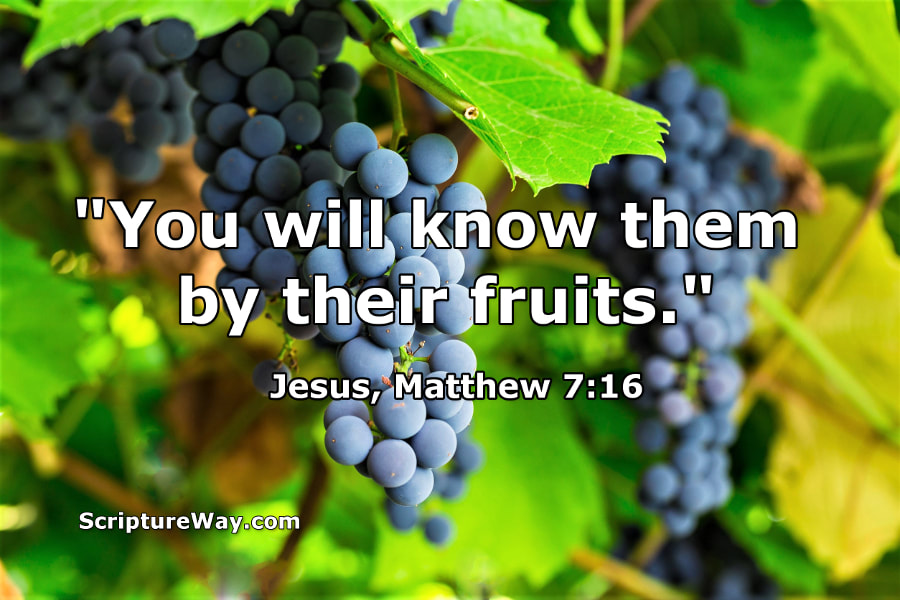
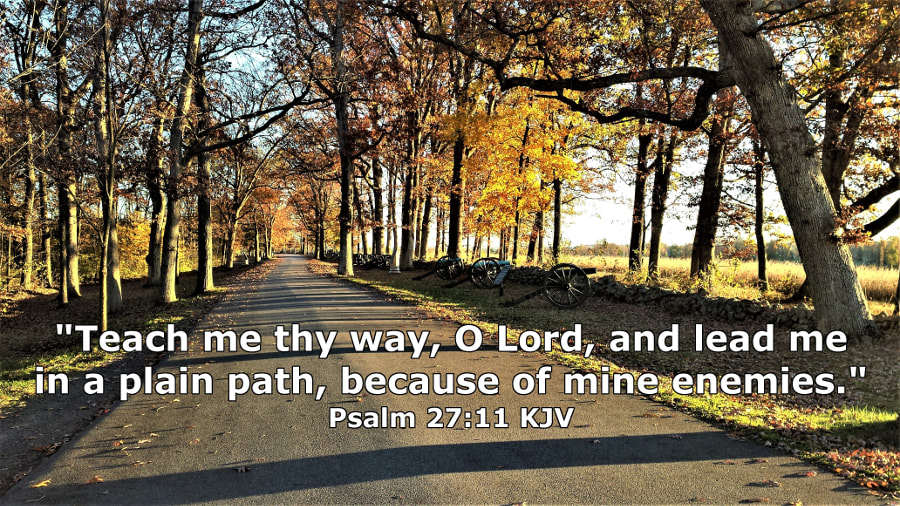
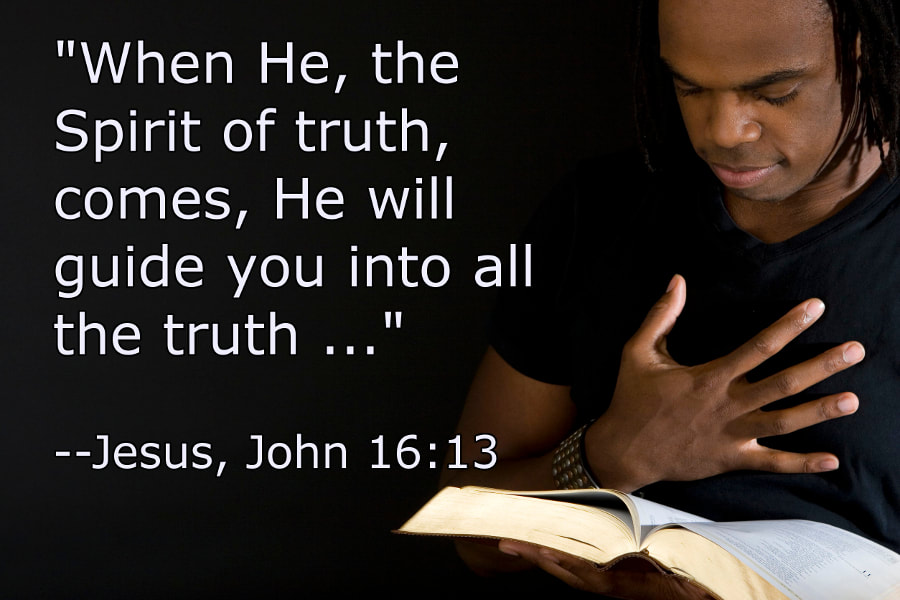
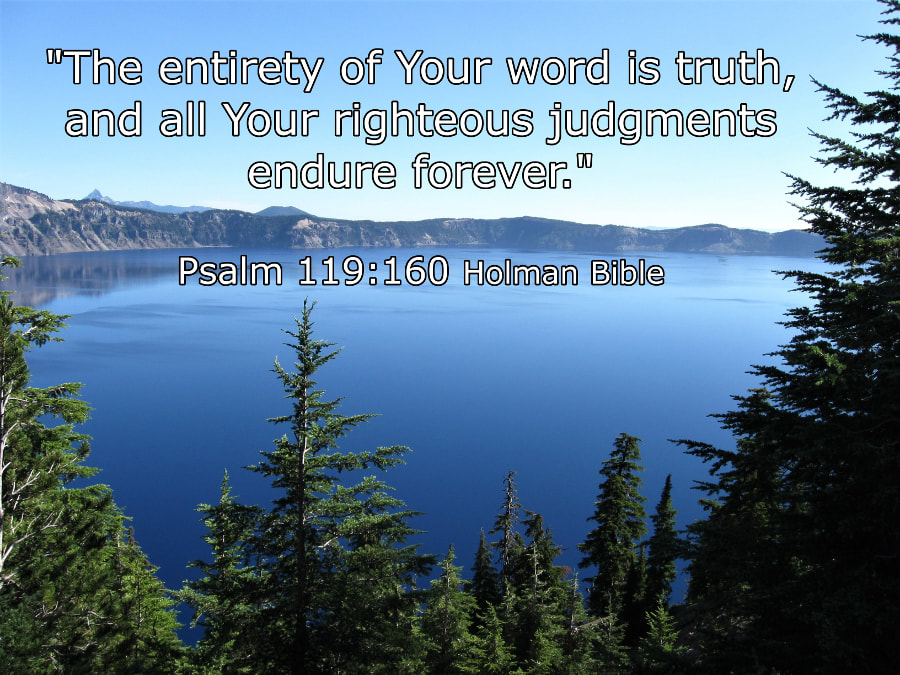

 RSS Feed
RSS Feed
